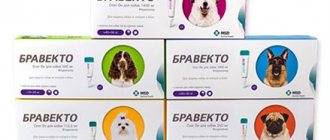Canine distemper or Carré's disease is a deadly viral disease. Manifested by fever, inflammation of the mucous membranes, and skin lesions. The disease affects the nervous system, the animal can die in terrible agony if treatment is not started in a timely manner.
Infection occurs through the respiratory tract and food. The disease has been known since the domestication of dogs; since then, many folk methods of treating it have appeared, one of which is vodka.
Is it possible to use this method?
Today, distemper is not as widespread as it was 10 years ago; the advent of the vaccine has saved many lives, but if the animal is sick, then qualified help will give a better chance of survival.
The worse the condition, the less likely it is that the dog will cope with the disease. In a hospital setting, the animal will be prescribed maintenance therapy, including glucose drips, improvement or deterioration will be monitored, and treatment will be adjusted in a timely manner, which means you will not lose your friend.
Treatment with vodka is controversial. In the case when it is not possible to show the animal to the veterinarian, there are no other medications at hand, and the animal is wasting away before our eyes, then it is worth trying this method. On the forums you can find positive reviews when the animal was literally pulled out from the other world.
Distemper can occur at lightning speed - the dog dies within a day, in which case vodka may no longer help. The acute form lasts three days; if left untreated, the animal will die. There is also a chronic one, in which the symptoms are not clearly expressed, the animal suffers for months and dies in the absence of proper treatment.
If it is possible to show the animal to a doctor, then the risk of using vodka will not be justified. It is impossible to make an accurate diagnosis at home, and there is a risk of causing even greater harm. Modern antibiotics are more effective than folk remedies and will better help your pet.
Vodka with garlic as an anthelmintic
Some dog lovers use vodka with garlic as a dewormer. Garlic is an antiparasitic agent. Vodka temporarily immobilizes helminths, so that during bowel movements much more of them come out than usual. Alcohol has no effect on helminth eggs.
But alcohol is very harmful to the liver, so vodka with garlic can be given only in the most extreme cases, when no other deworming agents can be obtained. The product is contraindicated for puppies under one year of age, pregnant and lactating females. Vodka with garlic is much less effective than pharmaceutical preparations.
Dosage
You need to give her from 30 to 125 ml of vodka depending on her weight, puppies - 25-30 ml, large dogs - 100-125 ml. Vodka is poured into the mouth using a syringe (without a needle).
How to get drunk?
You need to raise the dog’s head, insert a syringe into the corner of the mouth and inject the contents; if everything is done correctly, the dog will swallow the medicine. If you manage to open your mouth, then apply it to the root of the tongue, but don’t press too hard, you can also get dislocated with the plague.
Treatment with vodka will be effective if the dog has good immunity and the disease is mild. In the case of an acute infection, you cannot do without a doctor and serious measures.
It is important to determine whether it is plague, it can be confused with enteritis, then vodka will not only not help, but will also aggravate the course of the disease.
“Belenkaya” has destructive properties against pathogenic bacteria, and its therapeutic effect is associated with this action.
Vodka with vanillin against ticks
Ticks are a serious problem for summer residents. To repel ticks and mosquitoes, prepare a tincture of 100 ml of vodka and 2 g of vanillin. The product is infused for a week in a cool, dark place, and then poured into a spray bottle.
Before a walk, the hair on the dog’s belly, withers and paws is sprayed with vanilla tincture. When the fur is dry, the dog can be taken out.
Vanilla tincture does not provide a complete guarantee against insect bites; tar is more effective. But many owners prefer to use vanilla tincture, as it smells more pleasant than tar.
Your mark:
Features for different breeds
The recovery of a pet depends on its immune system; there are breeds in which it is naturally stronger than other members of the species. Laikas love the cold, are very hardy and, of course, their chance of suffering distemper is higher than that of pugs.
Vodka can be given to any breed of dog, depending on body weight, but this does not guarantee recovery. If your dog is in poor health, then vodka can make the situation worse.
Vodka is poison for both humans and animals. You should not give alcohol to your pet, but in the case of distemper, it can destroy harmful organisms and allow the dog’s immunity to cope with the disease.
Diseases for which dogs are given vodka
Vodka for a dog is an even more terrible poison than for a person: the animal’s body cannot easily tolerate the effects of ethanol. Therefore, there is no need to poison your four-legged friend with alcohol in case of any ailment.
Vodka is contraindicated if the cause of vomiting is viral hepatitis. It differs from distemper in that the dog’s stool is initially light (after a few days blood appears in it), and the urine is dark brown. The temperature in the first 2–3 days is normal, and then rises to 39–40 degrees.
With parvovirus enteritis, as with distemper, the dog loses its appetite, but it drinks water. There is a folk remedy for the treatment of enteritis, which includes egg white. Confusion has arisen: some owners decide that the protein should be mixed with vodka. The effect of a mixture consisting of raw egg white and water in case of a severe viral disease is already doubtful, and alcohol will only further burn the inflamed mucous membrane. Therefore, giving alcohol to a dog with enteritis is strictly prohibited.
Reviews
The opinions of dog owners differ, but they confirm the fact that everything depends on the animal. Moreover, some veterinarians resort to this popular method and are right. Someone vehemently opposes treating their four-legged friends with this antediluvian method, because they have already lost a dog once.
Someone treated sick puppies this way when antibiotics did not help, and now advises everyone they know to treat distemper exclusively with vodka. Each individual case requires its own treatment methods. The best way is to consult a veterinarian.
Vodka for severe exhaustion
People who are very cold drink a glass of vodka to warm up. Under the influence of alcohol, a person begins to sweat. But the dog does not have sweat glands, so it makes no sense to give alcohol to a dog that has fallen into an ice hole or been in the cold for a long time.
However, if the animal is exhausted to such an extent that it is impossible to palpate the veins and give an injection, even experienced veterinarians advise giving a little vodka. Alcohol will speed up your heart rate and blood flow, making it easier for the doctor to find the vein.
other methods
It is better to prevent a disease than to treat it later. Dogs are vaccinated against distemper at the age of 1.5-2 months, and after three weeks the procedure is repeated.
If the animal got sick before reaching this age, or for some reason was not vaccinated, then there are many methods, both traditional and folk.
- Etiotropic therapy. A serum that affects the pathogen is injected into the body. Among our drug manufacturers, the best are “Narvak” and “Biocenter”, among foreign ones – “Biovet” and “Merial”. Small dogs are given a single dose of 2 ml, large dogs – 5 ml.
- Immunostimulants, calcium and vitamin B are added to therapy. During illness, immunity decreases, and the nervous system may also be affected; drugs are prescribed to support them.
- At high temperatures, antipyretics are prescribed. For coughs and damage to the respiratory system, mucolytic drugs such as Bromhexine or Mucaltin are prescribed; the veterinarian will advise the dosage.
- Non-traditional methods include using a mixture of eggs, vodka and honey. You need to mix 25 ml of vodka, 1 chicken egg, 20 g. liquid fresh honey and pour into the dog’s mouth.
- You can also give your pet a mixture of chamomile and St. John's wort decoction. These herbs have anti-inflammatory properties. The mixture is prepared from 10 g. each type of herb, poured 100 ml of boiling water. The decoction is infused, filtered and given to the animal 50 ml once a day.
Treatment of poisoning with vodka
During a walk, a dog can pick up and eat something stale, and sometimes get poisoned by the poison used to poison rats or pigeons. In such cases, vodka or cognac with salt helps a lot.
If the animal is poisoned, but does not vomit, it needs to be given an emetic, for example, using a syringe without a needle, pour vegetable oil into the throat. Enemas of slightly salted water (a teaspoon of salt per liter of water) are also useful.
When the dog vomits, they give him vodka or cognac with salt (cognac is preferable). In order not to burn the mucous membrane, alcohol is diluted with water in a ratio of 1:1 or 1:2. Vodka with salt has a disinfecting effect. Ethanol kills pathogenic bacteria and speeds up metabolism, allowing toxins to be eliminated from the body faster.
Vodka dosage:
- for small dogs – 1–2 teaspoons;
- for medium breeds – 1–2 tablespoons;
- for large breeds – 2–3 tablespoons.
So much salt is added to alcohol so that the product acquires a pronounced salty taste, but does not become bitter.
Answer
In the scientific world, the disease is called Carré's disease. In common parlance - plague. The dogs die from the disaster.
Distemper has been known among dog breeders since ancient times and is also found among wild animals. The most dangerous age for entering the risk zone is cubs from three to twelve months. Adult pets are also at risk. The infection is transmitted from the patient through feces and secretions: nasal, oral and eye. Surprisingly, but true: a person becomes a carrier of the disease. The disease is not dangerous for people; a dog owner has the right to help a sick friend without fear.
Myths about the benefits of alcohol
From older generation dog lovers, when asked “is it possible to let dogs drink alcohol,” you can sometimes hear that vodka and moonshine are a panacea for food poisoning in four-legged dogs. They say that a tablespoon of strong alcohol poured into the mouth of an animal solves many problems. But modern veterinary medicine insists that such methods can only add to these very problems. Well, if this method of “treatment” is abused, you can completely destroy your pet.
There is another dubious “recipe” that says that dogs can and should drink alcohol, and in particular beer. It is believed that brewer's yeast in the drink itself promotes rapid growth of puppies, good weight gain and the growth of a beautiful thick coat. A completely logical question immediately follows - would you give your child beer so that he grows faster or has beautiful and thick hair? Probably no. Puppies are the same as children and alcohol is extremely dangerous for them. Even just a few uses will cause irreparable harm to a fragile body. After all, the destruction of liver and kidney cells is an irreversible process, and treatment can be lengthy, expensive and not always effective.
You may be interested in: What cereals can be given to dogs.
Treatment and help
If there is a suspicion of distemper, your four-legged friend urgently needs to be taken to a veterinary clinic. For treatment, complex therapy is prescribed, the animal is given injections that increase immunity.
If your pet is being treated at home after consultation with a doctor, you should set up a special place located in a dark corner (due to high photophobia), without drafts. It is important to regularly clean the eyes, nose and ears.
The water should be replaced with a decoction of St. John's wort and chamomile. If the nervous system is affected, take motherwort. The food is gentle: pureed soups with ground meat, liquid porridge. Feed low-fat cottage cheese and a raw egg 1-2 times a week.
Signs of alcohol poisoning in dogs
Symptoms of alcohol poisoning may amuse a drunk company, but not a responsible owner and a loving owner. If you have suspicions that your pet may have been poisoned by alcohol (he licked spilled beer or wine from the floor, one of the guests “treated” him while you were distracted), watch him carefully. The body reacts to ethanol:
- Increased activity or lethargy, drowsiness;
- Loss of coordination;
- Difficulty breathing;
- Frequent urination;
- Decreased body temperature;
- Frequent and severe bouts of vomiting;
- In severe cases, convulsions and tremors.
A very small amount of alcohol is enough for dogs to become intoxicated and the first symptoms of poisoning to appear. In an adult well-fed dog they appear within an hour or two, in a hungry dog after 30 minutes.
You might be wondering: Can dogs eat chocolate?











